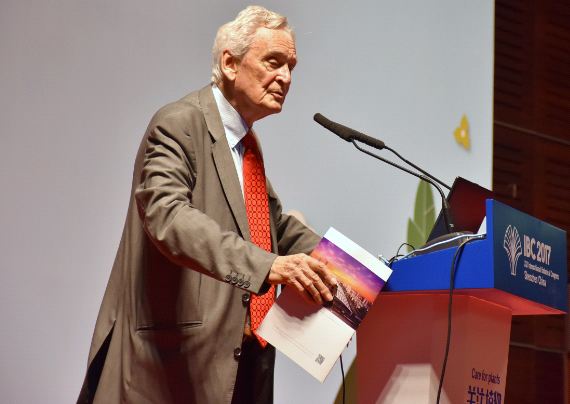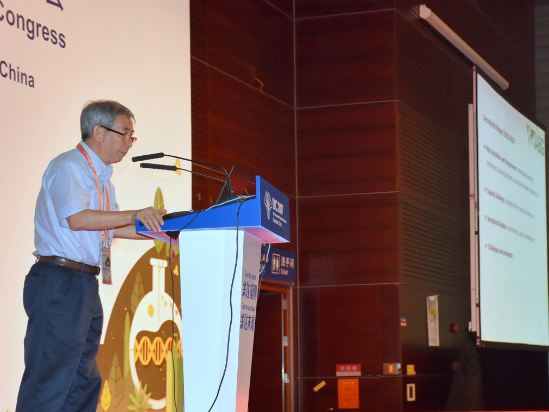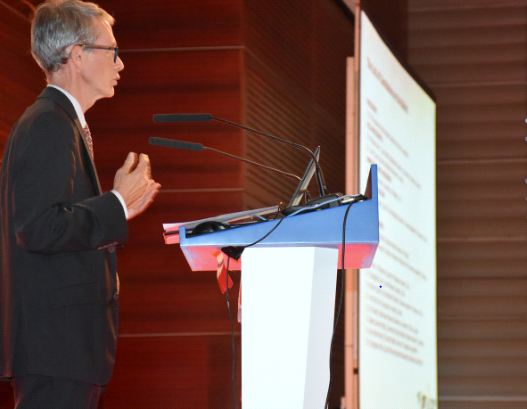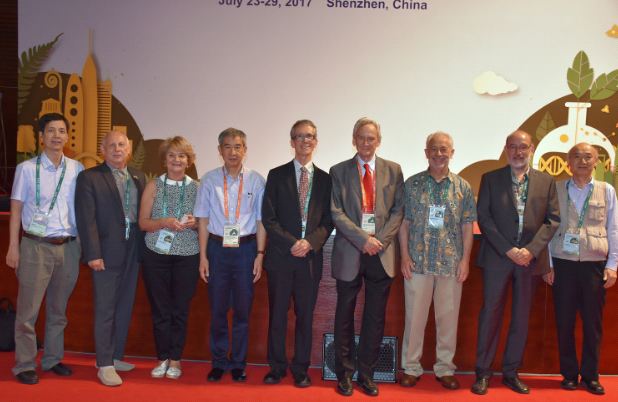Minutes of the 14th IABG General Meeting
(Shenzhen Convention and Exhibition Center, Shenzhen, China; July 26, 2017)
The 14th General Meeting of International Association of Botanic Gardens (IABG) was held in conjunction with the XIX International Botanical Congress (IBC) in Shenzhen, China, from 4:30 pm to 6 pm on Wednesday, 26 July 2017. The meeting included a report from the President and the IABG Secretariat, approval of new Constitution, election of the new Council and approval of the Work Plan for 2017-2023. The election and introduction of the new IABG Council was followed by a discussion on emerging issues and opportunities for the association.
Attendees
Serving Council Members
Professor Vernon Heywood (IABG President, University of Reading; Chair up to election result)
Professor Shan-an He (Immediate Past President, Nanjing Botanical Garden)
Professor Michael Kiehn (IABG Vice President, University of Vienna Botanical Garden)
Professor Hongwen Huang (IABG General Secretary, South China Botanical Garden, CAS)
Professor Tim Entwisle (Council Member, Australia; Chair following election)
Professor Jin Murata (Council Member, Japan)
Zhao Shiwei (Council Member, China)
Nominated Council members
Professor Hai Ren (nominated new Council Member, China)
Dr. Ana María Molina (nominated new Council Member, Argentina)
Professor Leonid Averyanov (nominated new Council Member, Russia)
Dr. Christopher Dunn (nominated new Council Member, USA)
Other IABG position holders
Professor Yonghong Hu (IABG Asian Division President, Shanghai Chenshan Botanical Garden)
Dr. Linhai Zhang (IABG Secretariat, South China Botanical Garden, CAS; minute-taker)
Others from botanical gardens attended the General Meeting, including representatives from Argentina, Australia, China, France, India, Japan, Mexico, Russia, South Africa, South Korea, Switzerland, UK and USA. It is estimated that approximately a total of 100 IABG members and others attended.
Apologies
Professor Kaiyun Guan (Vice-Secretary General, Director Turpan Eremophytes Botanical Garden, CAS)
Dedy Darnaedi (Vice-president, Indonesia)
Professor Alexander Demidov (Vice-president, Main Botanical Garden, Russia)
J. Esteban Hernandez Bermejo (Council Member, Spain)
Graciela Barreiro (Council Member, Argentina)
Christopher Willis (Council Member, South Africa)
Shaolin Zhang (Director, Nanshan Botanical Garden, China)
1. President Heywood called the meeting to order at 4:30 pm and chaired the first part of the meeting. He forwarded apologies from officers and council members not able to participant and then gave some brief opening remarks.
2. Secretary General Hongwen Huang presented the Secretariat Report (2013-2017), outlining as following (see full Secretariat Report 2013-2017 for detail):
1) Main Activities and Programmes
The 6th edition of IABG international directory of botanic gardens is in preparation, with a Global List of Botanic Gardens to be available by the end of 2017.
Action: Global List of Botanic Gardens to be updated and released by December 2017, followed by a new edition of the International Directory of Botanic Gardens
Encourages and supports the scientific management of botanic gardens, particularly in regard to climate change and invasive plants;
Five international conference or symposia have been organized.
IABG international training programmes have been developed and two training course by IABG-AD were organized successfully for administrators and scientific staff from 12 developing countries.
Revision of the constitution of IABG during 2014-2017 and a new constitution finalized after thorough revising and discussion, ready for final approval in the general meeting.
Accreditation scheme of world botanic gardens led by IABG is in progress.
Outreach programmes are active.
2) Capacity Building
IABG website (iabg.iubs.net) on-line since 2012.
Redesign of new IABG logo has been satisfactory and successfully in use since 2014.
Establishment of IABG regional divisions: IABG Asian Division was reestablished in November 2104; IABG South American Division has been under development since 2014; and IABG is working with the European Consortium and other botanic gardens in the Mediterranean region to establish a connection there.
IABG Secretariat office was established at South China Botanical Garden in 2012.
Promotion has commenced on social media with a WeChat group in China.
3) Secretariat is running well.
4) Challenges and Prospects
The need for council members to be more active and involved in the Council’s business and Association’s activities;
The need for much greater visibility and publicity for IABG’s activities; to make progress developing the membership and updating the International Directory; website updating;
Working closely with other regional and national botanic gardens organizations;
Resolving bottlenecks for IABG, such as the financial situation and legal status as NGO.
3. Report on the new revised Constitution by Vice-President Michael Kiehn
After the present IABG Board was elected in 2012, one of the priorities identified was to revise the Constitution of the IABG, taking into account the radically changed landscape and dramatically changed circumstances in which botanic gardens and related institutions are operating today. The amendment of the Constitution was incorporated into the IABG Workplan for 2014-2017. Vice-President Michael Kiehn was appointed to prepare the revision of the Constitution and a first draft was submitted for comments to the Council members in autumn 2015. The comments were incorporated into a second version of the new Constitution which was communicated again to the Council members. Third version was presented at the IABG Board meeting in Shanghai, November 2016. Additional comments received were included in the final version tabled at the meeting.
After Vice-President Michael Kiehn’s review, President Heywood then called approval of the new constitution. Dr. Peter Wyse Jackson from Missouri Botanical Garden raised a concern that those at the meeting needed time to review the constitution. After a short time, and following some brief discussion, the new constitution was ratified by those present.
Action: Send new constitution to all identified members of IABG, confirming that they are still part of IABG by October 2017
Action: President to send invitation to all botanic gardens not identified as members, inviting them to join IABG by November 2017
4. Report on the nomination and election process and Election of new IABG Officers and Council Members
The present IABG Officers and Council were elected in 2013. In accordance with the IABG Constitution, an election needed to be held in Shenzhen, China during the 19th IBC. The process of nomination began when an IABG nominating committee was appointed by President Vernon Heywood on 21 September 2016. Calls for nominations were distributed to both institution and individual memberships starting late September and early October 2016, and ended on 5 January 2017. A preliminary report on the nomination was filed on 5 January 2017. The final list reflected a balanced result of representatives across different continents and the world’s botanic gardens. Voting ballots with the list of the final nominees who have been nominated for the new officers and Council members were distributed to both institution and individual memberships starting on 26 February 2017. By close of voting on 15 June 2017, 83 eligible votes were received, representing 23 countries in six continents. Among eligible votes, 20 votes were casted by institutions and 63 votes by individual members. All candidates on the list received a significant majority of the votes.
The results were presented to the meeting for approval.
Dr. Alice Hughes from Xishuangbanna Tropical Botanical Garden raised concerns on gender balance in the proposed IABG new Council. President Heywood acknowledge this imbalance and noted that the matter had been raised by the Council during the election process. He agreed that IABG should continue to seek an increase in the representation of women. In all roles.
President Heywood called for ratification the election. The election results were approved by members unanimously.
The members elected for the new Council Board are the following:
PRESIDENT:
Professor Tim Entwisle (Royal Botanic Gardens Victoria, Australia)
VICE-PRESIDENTS:
Professor Michael Kiehn (Core Facility Botanical Garden, University of Vienna, Austria)
Dr. You-Mi Lee (Korean National Arboretum, Korea)
IMMEDIATE PAST PRESIDENT:
Professor Vernon Heywood (University of Reading, UK)
GENERAL SECRETARY:
Professor Hongwen Huang (South China Botanical Garden, Chinese Academy of Sciences, China)
COUNCIL MEMBERS:
Dr. Dalila Espírito-Santo (Ajuda Botanical Garden, Portugal)
Professor Leonid Averyanov (Komarov Botanical Institute of the Russian Academy of Science, Russia)
Mr. William A. McNamara (Quarryhill Botanical Garden, USA)
Dr. Christopher Dunn (Cornell Botanic Gardens, USA)
Professor Hai Ren (South China Botanical Garden, Chinese Academy of Sciences, China)
Dr. Yong-Shik Kim (Yeungnam University, Korea)
Professor Jin Murata (Koishikawa Botanical Gardens, University of Tokyo, Japan)
Dr. Alberto Gómez Mejía (Columbian National Botanic Gardens Network, Columbia)
Dr. Ana María Molina (El Jardín Botánico Arturo E. Ragonese, Argentina)
Dr. Christopher Willis (South African National Biodiversity Institute, South Africa)
Since a new constitution has been fully approved by the 14th IABG Meeting and has changed substantially the terms to be served by Council members and officers, the new board will be operated under the new Constitution.
4. The newly elected President Tim Entwisle took over the chairing of the second part of the meeting.
Newly-elected President Entwisle thanked Professor Heywood for leading the IABG through a period of change and consolidation. He also thanked Secretary General Hongwen Huang, assisted by LinHai Zhang, for their strong support of the President and the Council over the last five years. President Entwisle outlined his vision for IABG, including: raising its profile in botanic gardens worldwide, increasing membership, and encouraging greater participation by members in the activities of the Association. IABG first needed to set out clearly what we might call our ‘unique selling points’, and to explain the value of the Association to existing and potential members. Professor Entwisle welcomed feedback on how we might promote IABG and how we might make IABG better serve its members. He suggested as starting point that the strengths of IABG include a focus on:
• Science in botanic gardens (our connection with IUBS and the IBC makes this an obvious strength). In this realm we could focus on a broad range of research topics, such as systematics, biogeography, palaeobotany, horticultural science, plant breeding, etc.
• The value of the living collections as a resource for science – discovery and understanding, as well as conservation
• Diversity and appropriateness of plants for gardens and parks (urban horticulture), taking into account weed potential but also positives such as climate hardiness and selection of new variants for horticulture
• Scientific management of botanic gardens: for example, adapting to climate change, maintaining collections for science, conservation and amenity
• Quality horticulture and landscape design
• A broad-based accreditation scheme for botanic gardens
Action: Information Paper completed and working group formed to progress the accreditation scheme by December 2017
President Entwisle proposed to continue to hold meetings/conferences in conjunction with with IBC, with BGCI and with other regional groups. President Entwisle especially emphasized his desire to hear form members, welcoming their ideas and inputs.
5. Professor Entwisle opened up the meeting to a short discussion on issues and opportunities for IABG.
Dr. Nicole Cavender from the Morton Arboretum in the USA suggested that IABG should help strengthen academic and research roles of botanical gardens. Professor Heywood noted that IABG could probably do this through IUBS.
Mr. Jimmy Wu from Beijing suggested IABG encourage more young people and professionals to be active and involved. President Entwisle responded that IABG would like to be more attractive to young professionals, and would encourage representation by early career people, and more women, in Council and other roles.
A member from Europe expressed concerns about the degradation of teaching and research in botany and plant systematics in some western countries. President Entwisle said IABG could show strong leadership in this area given the focus in many botanic gardens on plant systematics. This might be through contributions to teaching but also stronger partnering with universities.
Professor Shrirang Yadav from Shivaji University in India would like to see IABG provide more support to establishing and strengthening botanical gardens in developing countries. President Entwisle said IABG would continue to work together with partners to facilitate training and provide expertise.
The meeting adjourned at approximately 6 pm with a brief message by President Entwisle to thank participants for all the support and ask members keeping involved and engaged.

President Heywood called the the 14th General Meeting to order and chaired the first part of the meeting

Secretary General Hongwen Huang presented the Secretariat Report (2013-2017)

The newly elected President Tim Entwisle took over the chairing of the second part of the meeting

The members elected for the new Council Board in the meeting




